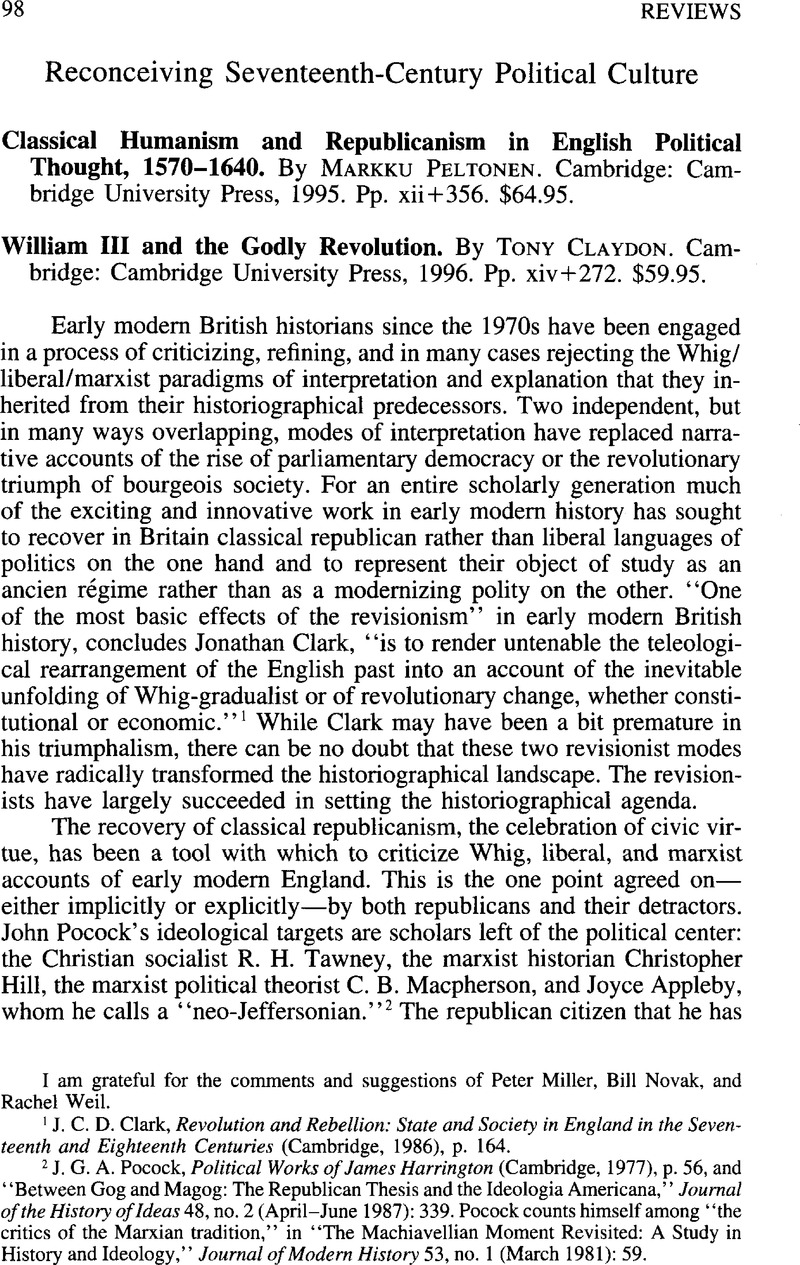Article contents
Reconceiving Seventeenth-Century Political Culture - Classical Humanism and Republicanism in English Political Thought, 1570–1640. By Markku Peltonen. Cambridge: Cambridge University Press, 1995. Pp. xii + 356. $64.95. - William III and the Godly Revolution. By Tony Claydon. Cambridge: Cambridge University Press, 1996. Pp. xiv + 272. $59.95.
Published online by Cambridge University Press: 10 January 2014
Abstract

- Type
- Reviews
- Information
- Copyright
- Copyright © North American Conference of British Studies 1999
References
I am grateful for the comments and suggestions of Peter Miller, Bill Novak, and Rachel Weil.
1 Clark, J. C. D., Revolution and Rebellion: State and Society in England in the Seventeenth and Eighteenth Centuries (Cambridge, 1986), p. 164CrossRefGoogle Scholar.
2 Pocock, J. G. A., Political Works of James Harrington (Cambridge, 1977), p. 56Google Scholar, and “Between Gog and Magog: The Republican Thesis and the Ideologia Americana,” Journal of the History of Ideas 48, no. 2 (April–June 1987): 339Google Scholar. Pocock counts himself among “the critics of the Marxian tradition,” in “The Machiavellian Moment Revisited: A Study in History and Ideology,” Journal of Modern History 53, no. 1 (March 1981): 59Google Scholar.
3 Pocock, J. G. A., Virtue, Commerce and History (Cambridge, 1985), p. 48CrossRefGoogle Scholar.
4 Pocock, , “Machiavellian Moment Revisited,” p. 55Google Scholar. It is true that in his more cautious moments Pocock says he is only critiquing a caricature of liberalism (see Political Works, p. 146; “Between Gog and Magog,” p. 337), but he fails to provide his readers with a description of liberalism with which he would be sympathetic.
5 Skinner, Quentin, “The Republican Ideal of Political Liberty,” in Machiavelli and Republicanism, ed. Bock, Gisela, Skinner, Quentin, and Viroli, Maurizio (Cambridge, 1990), pp. 304, 306Google Scholar.
6 Scott, Jonathan, “The English Republican Imagination,” in Revolution and Restoration: England in the 1650s, ed. Morrill, John (London, 1992), pp. 37–39Google Scholar.
7 Shapiro, Ian, Political Criticism (Berkeley, 1990), p. 167Google Scholar.
8 Dworkin, Ronald, “Liberalism,” in Liberalism and Its Critics, ed. Sandel, Michael J. (New York, 1984), pp. 72–75Google Scholar.
9 Appleby, Joyce, Liberalism and Republicanism in the Historical Imagination (Cambridge, Mass., 1992), p. 23Google Scholar.
10 Isaac, Jeffrey C., “Republicanism vs. Liberalism: A Reconsideration,” History of Political Thought 9, no. 2 (Summer 1988): 350Google Scholar. Similar assessments are offered by Herzog, Don, “Some Questions for Republicans,” Political Theory 14, no. 3 (August 1986): 473CrossRefGoogle Scholar; and Houston, Alan, Algernon Sidney and the Republican Heritage in England and America (Princeton, N.J., 1991), p. 3CrossRefGoogle Scholar.
11 Morrill, John, The Nature of the English Revolution (London, 1993), pp. 63, 68Google Scholar.
12 Ibid., p. 392. It should be noted that Morrill, unlike most of revisionists, thinks that “from the wreckage of England's religious wars, the liberal-democratic state was gradually to emerge” (p. 29). To my knowledge, Morrill has yet to focus his attention on the emergence of the liberal democratic state.
13 Scott, Jonathan, “England's Troubles, 1603–1702,” in The Stuart Court and Europe, ed. Smuts, Malcolm (Cambridge, 1996), pp. 21, 34–35Google Scholar.
14 Scott, Jonathan, “England's Troubles: Exhuming the Popish Plot,” in The Politics of Religion in Restoration England, ed. Harris, Tim, Seaward, Paul, and Goldie, Mark (Oxford, 1990), p. 110Google Scholar.
15 Clark, J. C. D., English Society, 1688–1832 (Cambridge, 1985), p. 9Google Scholar.
16 Ibid., p. 51.
17 Ibid., p. 278.
18 Oddly, Peltonen shifts his ground later in the volume, claiming that “Tacitean themes and stoic forbearance were thus supplanting Ciceronian ideals” in the 1620s and 1630s (p. 283). Apparently, and with little explanation, Peltonen has become less impressed with the extremely important work of Miller, Peter, Defining the Common Good: Empire, Religion and Philosophy in Eighteenth Century Britain (Cambridge, 1994), pp. 27–72CrossRefGoogle Scholar, than he had been on p. 135. Miller argues extremely persuasively that there was no shift away from Cicero in the period in question.
19 Though it should be noted that Skinner, unlike Pocock, no longer describes republicanism as committed to a concept of positive liberty. See Skinner, , “The Republican Ideal of Political Liberty,” pp. 293–309Google Scholar, and “On Justice, the Common Good, and the Priority of Liberty,” in Dimensions of Radical Democracy, ed. Mouffe, Chantal (London, 1992), pp. 211–24Google Scholar.
20 See, among others, David Wootton's excellent discussion, “The Republican Tradition: From Commonwealth to Common Sense,” in Republicanism, Liberty and Commercial Society, 1649–1776, ed. Wootton, David (Stanford, Calif., 1994), esp. pp. 13–41Google Scholar.
21 Bailyn, Bernard, Context in History (Melbourne, 1995), p. 15Google Scholar.
22 Kloppenberg, James, “The Virtues of Liberalism: Christianity, Republicanism and Ethics in Early American Political Discourse,” Journal of American History 74, no. 1 (June 1987): 33CrossRefGoogle Scholar.
23 Houston, , Algernon Sydney, p. 277Google Scholar. See also Isaac, , “Republicanism vs. Liberalism,” p. 355Google Scholar.
- 1
- Cited by




